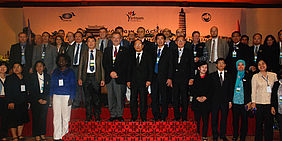United Nations World Tourism Organisation (UNWTO) adopts Declaration on Spiritual Tourism for Sustainable Development
The UNWTO International Conference on Spiritual Tourism was held in Ninh Binh, Vietnam, on 21-22 November 2013. As a result of the event, UNWTO is now launching the Ninh Binh Declaration "Spiritual Tourism for Sustainable Development".
Growth market spiritual tourism
Spiritual tourism is a growth market. The most important driver is a change in values that is currently taking place in many important source markets for tourism, such as Germany - a shift away from material to mental values. During this change in values, spirituality is gaining in importance for many people. Spirituality does not only mean a spiritual attitude of a religious nature, but also a general preoccupation with questions of meaning and values of existence, the world and people and especially of one's own existence and self-realisation in life.
Spiritual tourism as an instrument of sustainable regional development in Vietnam
Also, in Vietnam more and more people on their journey are also interested in gathering spiritual impressions and experiences. This development can be seen as a special opportunity. Not only because Vietnam offers innumerable places and possibilities to satisfy the needs of this target group, but also because spiritually influenced travel harmonises ideally with the country's tourism model. The country's declared aim is to implement socially and environmentally responsible tourism development.
Linkages with the "EU-Responsible Tourism Programme
The concrete linkage between spiritual forms of tourism on the one hand and the model of socially and environmentally sustainable tourism development in Vietnam on the other hand were explained by Kai Partale, on behalf of the EU-Responsible Tourism Programme in his presentation "Enhancing the Positive Effects of Spiritual Tourism through Responsible Tourism". Kai made clear that tourism is an effective instrument of sustainable regional development, which also and especially in remote or disadvantaged destinations provides broad benefits. Spiritual forms of tourism fulfil this demand ideally, especially if one assumes that the target groups travel and act in a particularly responsible manner.
Challenges for the development of spiritual tourism
However, the promotion of spiritual forms of tourism also poses special challenges. Especially in this segment, a careful analysis of the very differentiated needs is required. Spiritual tourism is a segment that includes a large number and variety of trips. The needs of spiritual tourists are quite different.
The questions of how the tourist offer in Vietnam must be developed and which products and services are needed to exploit the existing potential in this segment are also part of current activities of the ESRT programme. The guiding principle of sustainable tourism development always provides the framework. Kai Partale presented some good practice examples and product guidelines in his keynote. He also presented the "Vietnam Responsible Tourism Toolkit", a pool of ideas, suggestions and concrete instruments for the implementation of socially and environmentally responsible tourism.
The results of the conference were finally adopted in a UNWTO Declaration on Spiritual Tourism for Sustainable Development.
Contact person: Kai Partale
